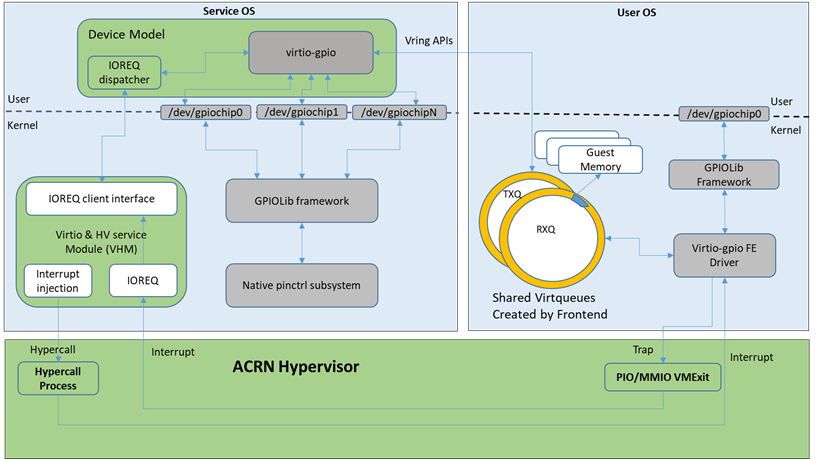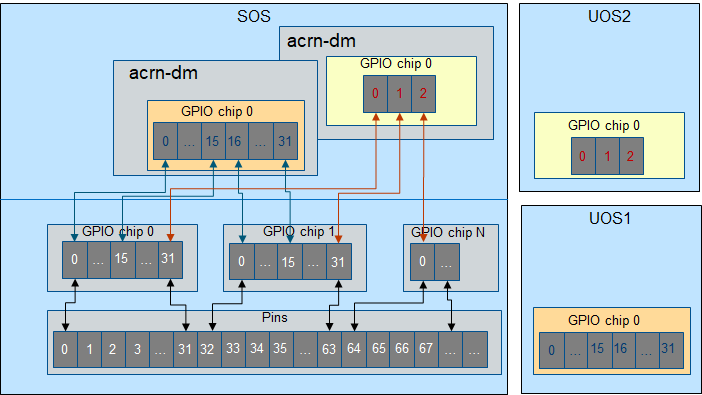Virtio-gpio¶
virtio-gpio provides a virtual GPIO controller, which will map part of native GPIOs to UOS, UOS can perform GPIO operations through it, including setting values, including set/get value, set/get direction and set configuration (only Open Source and Open Drain types are currently supported). GPIOs quite often be used as IRQs, typically for wakeup events, virtio-gpio supports level and edge interrupt trigger modes.
The virtio-gpio architecture is shown below

Figure 230 Virtio-gpio Architecture
Virtio-gpio is implemented as a virtio legacy device in the ACRN device model (DM), and is registered as a PCI virtio device to the guest OS. No changes are required in the frontend Linux virtio-gpio except that the guest (UOS) kernel should be built with CONFIG_VIRTIO_GPIO=y.
There are three virtqueues used between FE and BE, one for gpio operations, one for irq request and one for irq event notification.
Virtio-gpio FE driver will register a gpiochip and irqchip when it is probed, the base and number of gpio are generated by the BE. Each gpiochip or irqchip operation(e.g. get_direction of gpiochip or irq_set_type of irqchip) will trigger a virtqueue_kick on its own virtqueue. If some gpio has been set to interrupt mode, the interrupt events will be handled within the irq virtqueue callback.
GPIO mapping¶

Figure 231 GPIO mapping
- Each UOS has only one GPIO chip instance, its number of GPIO is based on acrn-dm command line and GPIO base always start from 0.
- Each GPIO is exclusive, uos can’t map the same native gpio.
- Each acrn-dm maximum number of GPIO is 64.
Usage¶
add the following parameters into command line:
-s <slot>,virtio-gpio,<@controller_name{offset|name[=mapping_name]:offset|name[=mapping_name]:…}@controller_name{…}…]>
- controller_name: Input “ls /sys/bus/gpio/devices” to check native gpio controller information.Usually, the devices represent the controller_name, you can use it as controller_name directly. You can also input “cat /sys/bus/gpio/device/XXX/dev” to get device id that can be used to match /dev/XXX, then use XXX as the controller_name. On MRB and NUC platforms, the controller_name are gpiochip0, gpiochip1, gpiochip2.gpiochip3.
- offset|name: you can use gpio offset or its name to locate one native gpio within the gpio controller.
- mapping_name: This is optional, if you want to use a customized name for a FE gpio, you can set a new name for a FE virtual gpio.
Example¶
Map three native gpio to UOS, they are native gpiochip0 with offset of 1 and 6, and with the name “reset”. In UOS, the three gpio has no name, and base from 0.:
-s 10,virtio-gpio,@gpiochip0{1:6:reset}
Map four native gpio to UOS, native gpiochip0’s gpio with offset 1 and offset 6 map to FE virtual gpio with offset 0 and offset 1 without names, native gpiochip0’s gpio with name “reset” maps to FE virtual gpio with offset 2 and its name is “shutdown”, native gpiochip1’s gpio with offset 0 maps to FE virtual gpio with offset 3 and its name is “reset”.:
-s 10,virtio-gpio,@gpiochip0{1:6:reset=shutdown}@gpiochip1{0=reset}